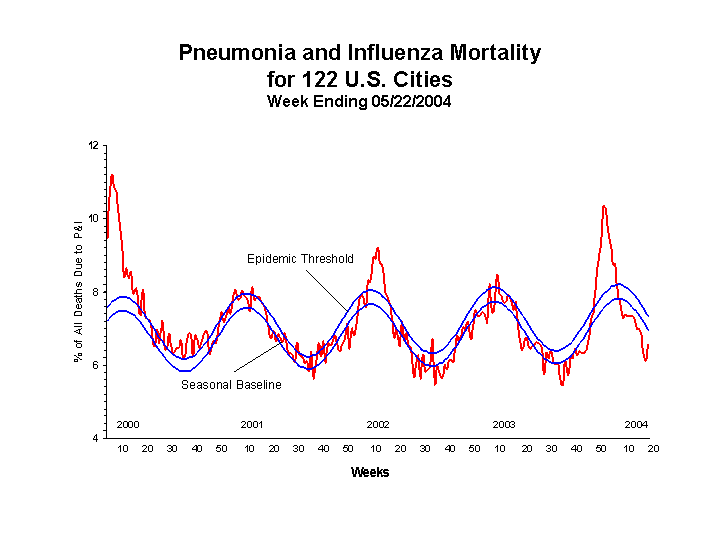This year's flu vaccine doesn't even contain the Fujian strain which is responsible for most deaths.
It doesn't look like the flu shot has had a meaningful impact on flu deaths over the last 4 years, according to the Center for Disease Control's statistics. One document states that the flu death rates have increased from about 20,000 per year in the 1970's and 1980's to 36,000 per year in the 1990's.

Compare them with mortality statistics from an earlier period:

Note the side effects of the flu shot:
What are the side effects that could occur?
Soreness, redness, or swelling where the shot was given
Fever (low grade)
Aches
If these problems occur, they begin soon after the shot and usually last one to two days.
Hmm ... sounds suspiciously flu-esque.
Can severe problems occur?
Life-threatening allergic reactions are very rare. Signs of serious allergic reaction can include breathing problems, hoarseness or wheezing, hives, paleness, weakness, a fast heartbeat, or dizziness. If they do occur, it is within a few minutes to a few hours after the shot. These reactions are more likely to occur among persons with a severe allergy to eggs, because the viruses used in the influenza vaccine are grown in hens' eggs. People who have had a severe reaction to eggs or to a flu shot in the past should not get a flu shot before seeing a physician.
Guillain-Barré syndrome: Normally, about one person per 100,000 people per year will develop Guillain-Barré syndrome (GBS), an illness characterized by fever, nerve damage, and muscle weakness. In 1976, vaccination with the swine flu vaccine was associated with getting GBS. Several studies have been done to evaluate if other flu vaccines since 1976 were associated with GBS. Only one of the studies showed an association. That study suggested that one person out of 1 million vaccinated persons may be at risk of GBS associated with the vaccine.
According to the World Health Organization's mortality statistics, 1665 people died of influenza in 1999 out of a population of 272,691,000. That means that 6 people per million dies of influenza. One is 6 times more likely to develop Guillain-Barré syndrome than they are to die from influenza. In 1995, 606 people died of influenza in the U.S.
Check out the side effects for the LAIV (live attentuated influenza vaccine):
Side Effects
• Symptoms are reported more often in healthy recipients of LAIV than in healthy recipients of placebo. These include:
o Nasal congestion/runny nose
o Sore throat
o Cough
o Chills
o Tiredness/weakness
Side effects in children
o Nasal congestion/runny nose
o Headache
o Fever
o Vomiting
o Abdominal pain
o Myalgias
o One unpublished study in 12- to 59- month-olds suggested an association of influenza vaccination with asthma or reactive airways disease. Further analyses and studies are pending on this issue.
I find this last potential side effect to be the most concerning.
And here's a quote from the CDC website:Preliminary Assessment of the Effectiveness of the 2003--04 Inactivated Influenza Vaccine --- Colorado, December 2003
Influenza activity started earlier than usual in the United States this season, with widespread influenza activity* reported in 10 states by November 22, 2003 (1). The predominant influenza viruses (A/Fujian/411/2002 [H3N2]-like viruses) circulating this season differ antigenically from the 2003--04 influenza A (H3N2) vaccine strain (2). A retrospective cohort study was conducted among workers at a Colorado hospital to provide preliminary data on the effectiveness of trivalent inactivated influenza vaccine (TIV) against influenza-like illness (ILI). This report summarizes the results of that study, which indicated that TIV had no or low effectiveness against ILI. However, additional studies are needed to evaluate the effectiveness of the 2003--04 vaccine against laboratory-confirmed influenza and influenza-related complications, including hospitalization and death. Influenza vaccine continues to be recommended, particularly for persons at increased risk for influenza-related complications, their household contacts, and health-care personnel.
Argh. I don't care what people do with their own bodies. I don't care what crap they buy into. I do care about media incited hysteria that leads to people dying in the process of buying into crap.








No comments:
Post a Comment